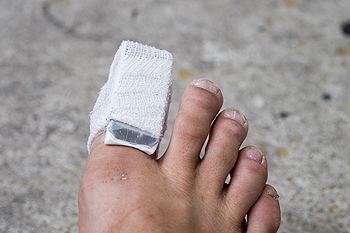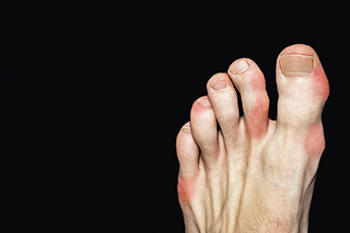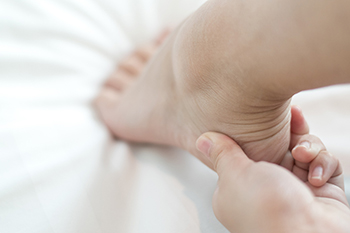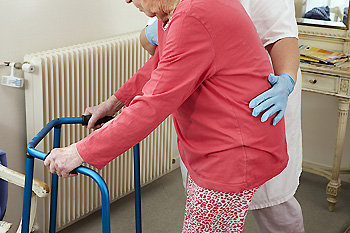Items filtered by date: June 2022
Should You Run on a Broken Toe?

If you are a runner and are experiencing some pain in one of your toes, look for the following signs that may indicate you have a broken toe. First, is the pain you are feeling intense and throbbing? Do you notice any deformity, lumps or bumps on the toe? Is it difficult to walk or run? If you answered yes to any of these questions, you may have a broken toe. Swelling and severe bruising may also be present with a broken toe, and the toenail may also be discolored. A podiatrist can examine your foot and run imaging tests to make an accurate diagnosis. There are many ways a podiatrist can help your broken toe to heal, depending on which toe it is, where it is broken, and how badly it is broken. You will, no doubt, be anxious to get back to training, but running on a broken toe is not suggested. Listen to your body and your podiatrist, who will advise you on when it is safe to begin running again. Ask if there are other exercises you can do in the meantime to stay active.
Sports related foot and ankle injuries require proper treatment before players can go back to their regular routines. For more information, contact Dr. Ronald Sheppard of Warren-Watchung Podiatry Center. Our doctor can provide the care you need to keep you pain-free and on your feet.
Sports Related Foot and Ankle Injuries
Foot and ankle injuries are a common occurrence when it comes to athletes of any sport. While many athletes dismiss the initial aches and pains, the truth is that ignoring potential foot and ankle injuries can lead to serious problems. As athletes continue to place pressure and strain the area further, a mild injury can turn into something as serious as a rupture and may lead to a permanent disability. There are many factors that contribute to sports related foot and ankle injuries, which include failure to warm up properly, not providing support or wearing bad footwear. Common injuries and conditions athletes face, including:
- Plantar Fasciitis
- Plantar Fasciosis
- Achilles Tendinitis
- Achilles Tendon Rupture
- Ankle Sprains
Sports related injuries are commonly treated using the RICE method. This includes rest, applying ice to the injured area, compression and elevating the ankle. More serious sprains and injuries may require surgery, which could include arthroscopic and reconstructive surgery. Rehabilitation and therapy may also be required in order to get any recovering athlete to become fully functional again. Any unusual aches and pains an athlete sustains must be evaluated by a licensed, reputable medical professional.
If you have any questions please feel free to contact one of our offices located in Marlboro and Watchung, NJ . We offer the newest diagnostic and treatment technologies for all your foot and ankle needs.
Do Your Child's Feet Hurt?
How Long Can Gout Last?

Severe pain, swelling, and redness surrounding the joint in the big toe can be indicative gout. It is a form of arthritis, and it can come from genetic factors or from eating foods that are high in purine levels. Elevated levels of purine can produce uric acid, and form crystals that can build up in the joints of the big toe. Some foods that have large amounts of purines include red meat, shellfish, and drinks that are made with large amounts of sugar. Additionally, people who are overweight, have high blood pressure, or who are diabetic may be prone to getting gout. This condition occurs in flare-ups and can last up to a week. Chronic gout may cause loss of mobility and joint damage. There are effective preventative methods that may help to control the onset of gout. These can consist of incorporating a healthy diet into your daily routine, performing simple exercise programs, and maintaining an acceptable weight. If you suffer from gout, it is strongly suggested that you are under the care of a podiatrist who can help you with additional prevention and treatment options.
Gout is a painful condition that can be treated. If you are seeking treatment, contact Dr. Ronald Sheppard from Warren-Watchung Podiatry Center. Our doctor will treat your foot and ankle needs.
What Is Gout?
Gout is a form of arthritis that is characterized by sudden, severe attacks of pain, redness, and tenderness in the joints. The condition usually affects the joint at the base of the big toe. A gout attack can occur at any random time, such as the middle of the night while you are asleep.
Symptoms
- Intense Joint Pain - Usually around the large joint of your big toe, and it most severe within the first four to twelve hours
- Lingering Discomfort - Joint discomfort may last from a few days to a few weeks
- Inflammation and Redness -Affected joints may become swollen, tender, warm and red
- Limited Range of Motion - May experience a decrease in joint mobility
Risk Factors
- Genetics - If family members have gout, you’re more likely to have it
- Medications - Diuretic medications can raise uric acid levels
- Gender/Age - Gout is more common in men until the age of 60. It is believed that estrogen protects women until that point
- Diet - Eating red meat and shellfish increases your risk
- Alcohol - Having more than two alcoholic drinks per day increases your risk
- Obesity - Obese people are at a higher risk for gout
Prior to visiting your podiatrist to receive treatment for gout, there are a few things you should do beforehand. If you have gout you should write down your symptoms--including when they started and how often you experience them, important medical information you may have, and any questions you may have. Writing down these three things will help your podiatrist in assessing your specific situation so that he or she may provide the best route of treatment for you.
If you have any questions, please feel free to contact one of our offices located in Marlboro and Watchung, NJ . We offer the newest diagnostic and treatment technologies for all your foot care needs.
Determining the Cause of Your Heel Pain

There are many possible causes of heel pain, with plantar fasciitis being the most probable. This condition is an inflammation of the plantar fascia tissue on the bottom of the foot that connects the toes with the heel. This is where the pain is felt. Pain on the bottom of the heel may also be due to a stress fracture in the heel caused by repetitive stress. Pain at the back of the heel can be caused by several additional conditions. Heel bursitis occurs when the fluid-filled bursa sac at the back of the heel becomes irritated and inflamed. Haglund’s deformity is a bony enlargement at the back of the heel which can sometimes be caused by high-heeled, or hard-backed shoes that rub against the area. Achilles tendinitis is an inflammation of the Achilles tendon that also produces pain at the back of the heel where it attaches to the heel bone. Sever’s disease, which is an inflammation of the heel growth plate in growing children, can also cause pain in the back of the heel. A podiatrist is highly skilled at pinpointing the underlying issue causing heel pain and treating it accordingly. Make an appointment today if you are experiencing any kind of heel pain.
Many people suffer from bouts of heel pain. For more information, contact Dr. Ronald Sheppard of Warren-Watchung Podiatry Center. Our doctor can provide the care you need to keep you pain-free and on your feet.
Causes of Heel Pain
Heel pain is often associated with plantar fasciitis. The plantar fascia is a band of tissues that extends along the bottom of the foot. A rip or tear in this ligament can cause inflammation of the tissue.
Achilles tendonitis is another cause of heel pain. Inflammation of the Achilles tendon will cause pain from fractures and muscle tearing. Lack of flexibility is also another symptom.
Heel spurs are another cause of pain. When the tissues of the plantar fascia undergo a great deal of stress, it can lead to ligament separation from the heel bone, causing heel spurs.
Why Might Heel Pain Occur?
- Wearing ill-fitting shoes
- Wearing non-supportive shoes
- Weight change
- Excessive running
Treatments
Heel pain should be treated as soon as possible for immediate results. Keeping your feet in a stress-free environment will help. If you suffer from Achilles tendonitis or plantar fasciitis, applying ice will reduce the swelling. Stretching before an exercise like running will help the muscles. Using all these tips will help make heel pain a condition of the past.
If you have any questions please contact one of our offices located in Marlboro and Watchung, NJ . We offer the newest diagnostic and treatment technologies for all your foot and ankle needs.
Exercise May Help to Prevent Falling

Research has indicated that practicing exercise is the most beneficial method that may help to decrease the risk of falling. This may be the most effective fall prevention method seniors 65 or older can practice. Other successful techniques can include improving lighting in the household, removing worn rugs, and installing grab bars in the shower and toilet area. Clutter is important to throw away, and this can help to make the home safer. Additionally, many seniors choose to use walkers and canes to maintain balance, and this can help to prevent falling. One out of five seniors will suffer a serious injury as a result of falling, and it is important to implement as many prevention strategies as possible. Having regular physical and eye examinations is necessary to keep medications and eyeglass prescriptions up to date. If you would like more information about how falling can affect the feet, and how to keep the home safe, please confer with a podiatrist.
Preventing falls among the elderly is very important. If you are older and have fallen or fear that you are prone to falling, consult with Dr. Ronald Sheppard from Warren-Watchung Podiatry Center. Our doctor will assess your condition and provide you with quality advice and care.
Every 11 seconds, an elderly American is being treated in an emergency room for a fall related injury. Falls are the leading cause of head and hip injuries for those 65 and older. Due to decreases in strength, balance, senses, and lack of awareness, elderly persons are very susceptible to falling. Thankfully, there are a number of things older persons can do to prevent falls.
How to Prevent Falls
Some effective methods that older persons can do to prevent falls include:
- Enrolling in strength and balance exercise program to increase balance and strength
- Periodically having your sight and hearing checked
- Discuss any medications you have with a doctor to see if it increases the risk of falling
- Clearing the house of falling hazards and installing devices like grab bars and railings
- Utilizing a walker or cane
- Wearing shoes that provide good support and cushioning
- Talking to family members about falling and increasing awareness
Falling can be a traumatic and embarrassing experience for elderly persons; this can make them less willing to leave the house, and less willing to talk to someone about their fears of falling. Doing such things, however, will increase the likelihood of tripping or losing one’s balance. Knowing the causes of falling and how to prevent them is the best way to mitigate the risk of serious injury.
If you have any questions, please feel free to contact one of our offices located in Marlboro and Watchung, NJ . We offer the newest diagnostic and treatment technologies for all your foot care needs.

